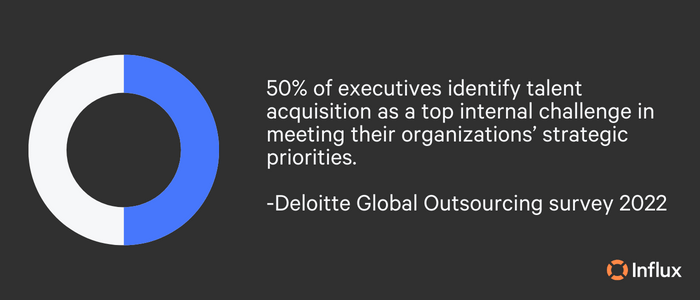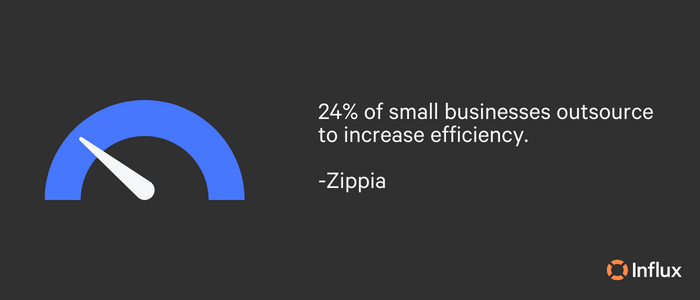Searching for business support to improve operations? Influx solutions are affordable and rewarding.
Labor shortages, economic insecurity, and other uncertainties require strategic solutions from businesses looking to maintain vision and delivery. Because of this, optimizing business efficiency is top of mind for many leaders.
The solution may be simple in theory, but in practice, improving business operations requires well-thought-out blueprints that are backed by data and approached with patience. How, exactly, can a business improve operations? Let’s talk about it!
What is operational efficiency in business?
Operational efficiency in business focuses on increasing productivity and simplifying processes in order to decrease friction, repetition, and waste while preserving customer relationships. It enables a company to eliminate excessive expenses and enhance ROI with calculated resource allocation.
Implementing new, strategic processes should produce high-quality results faster and with fewer resources. The greater the quantity of output an organization can generate from a given amount of input, the more efficient its processes are likely to be. To put it briefly, efficient companies are flexible and more profitable.
Limiting the amount of time spent by a team on non-value-added activities results in optimized and valuable work. Keep in mind that some investments may be costly upfront, but allow for overall efficiency and increased profits in the long term. If a company can sustain high levels of operational efficiency, it should be able to create more profit from each project while using the same or fewer resources.

How to measure operational efficiency
One way to measure operational efficiency is with an “efficiency ratio” between inputs and outputs. To determine how well a business uses its resources, an efficiency ratio measures a company’s expenses with its revenue. The basic formula is as follows.
Efficiency ratio=expenses/revenue
Another way to measure efficiency is by empowering your team with data literacy and dashboards or software. Understanding in-depth insights as a way to measure success mean that improved efficiency is a company-wide effort, not just something that trickles down from leaders or managers. Equip your team with the ability to read and accurately interpret data for overall decision-making powered by analysis.
How to improve business operations
1. Evaluate and refine processes
Examine your company processes to uncover inefficiencies. Hunt for ways to simplify procedures and eliminate any wasted work. Looking at the big picture, evaluate your standardized workflow for any areas that could benefit from development.
2. Turn to outsourcing or freelancers
Working with freelancers or outsourcing partners is a popular option for businesses looking to increase operational efficiency. There are many benefits to working with freelancers or outsourcing partners. Some of them include:
- Access to specialized talent
- Cost savings
- Faster deliverables
- No long-term commitments
- Ease finding, hiring, and training
- Flexibility
- Fresh perspectives
Outsourced support maximizes internal resources and lets employees focus on crucial core functions. Influx is ready to begin in less than one week by providing the support you need to optimize your internal operations. We offer flexibility at scale with simple month-to-month pricing. Discover your support solution for increased business operations.
3. Automate repetitive work
In your examination, you may discover monotonous tasks that could be automated. Perhaps there are reports you can automatically generate or tools to implement that take care of repetition.
Because repetitive tasks can quickly become boring, this can result in a lack of motivation or decreased productivity. To create a more efficient workplace, consider the value of repetitive tasks. Are they necessary? While some repetitive work is mandatory, it could save time to shorten these responsibilities to only what is needed.

4. Invest in employee training and development
As a way to gain and retain top talent, increase satisfaction, and earn more profit, investing in employee training can keep your business evolving with the times. In an ever-changing digital world, new skills are needed to maintain efficiency.
Taking the time to learn new systems and sharpen expertise prevents your team from mistakes that could hinder production and boosts workplace engagement, resulting in increased productivity.
5. Consider remote or hybrid work
As a supporter of the work-from-anywhere movement, Influx has mastered management, communication tools, and collaboration platforms to provide top-tier support for businesses all across the world. Not every business has the ability to work from home or to offer hybrid work, but for those that do, it could result in more productivity. In fact, according to ConnectSolution…
77% of remote workers say they’re more productive when working from home, with 30% doing more work in less time and 24% doing more work in the same period of time.
Remote work is also known to boost team morale with better work-life balance. Perhaps increased productivity is due to peace and quiet, or it could be that workers feel more motivated because they’ve been given a bit more freedom to work around their own schedule. Whatever the reason, remote work is proven to improve performance. For some steps on remote work success, check out our blog on remote work and its benefits.
6. Implement cost-cutting initiatives
When every cent counts, even the slightest boost in sales or cost-cutting measures can have a significant influence on profitability. Cost-cutting refers to an organization taking actions or measures to reduce its costs. Although it is common to implement cost cutting measures during times of financial distress or economic downturns, cost-cutting can also be utilized for growth and to compete more effectively in your industry.
Cost-cutting should be approached gradually and by executing smaller measures first. Reducing costs may also require negotiation and building trust with suppliers. While it’s possible to secure lower pricing, businesses should not do so at the expense of quality. Evaluate your budgets and frequently review operational costs to stay within parameters. Cutting costs may also mean spending to save in the long run by investing in higher-quality equipment that benefits output.

7. Lean into marketing and sales departments
There is always a need for high-impact marketing and without consistent sales coming in, it could completely tank your goal for efficiency. A marketing budget typically ranges between 5-25% of a company’s revenue or revenue targets. For smaller businesses, marketing investments lie on the lesser end. The point is that a steady stream of customers is necessary and an excellent motivator to continue improving operations for growth.
We hope these tips have been helpful and that you have a better understanding of how to improve operational efficiency. If you’re looking for more information, read our guide on strengthening business operations.
Improving operational efficiency
Influx supports businesses of all sizes to improve business operations. With flexible solutions designed to scale, our teams are available 24/7 for support you can trust. Our experts are trained in your brand voice to be an extension of your existing team. From faster response times to improved service performance or adaptable teams that match your workflow, Influx offers various support solutions that are affordable and worthwhile. Expand your operations with Influx!


 6 Circle - small.png)